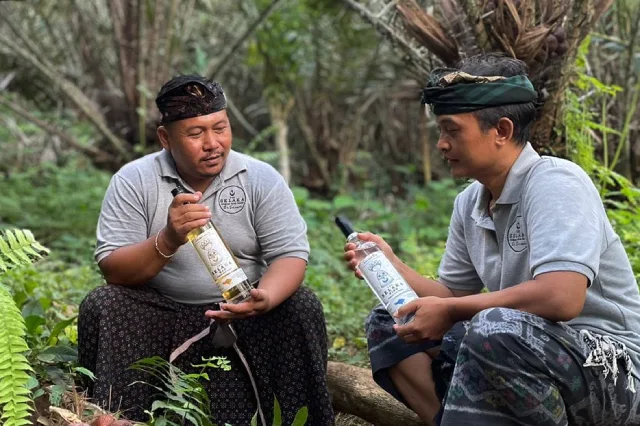Things to Do in Bali
Etiquette is the practice of socially and culturally acceptable behavior.
Following Balinese etiquette shows respect.
Bali is Very Tolerant – Too Tolerant?
The Balinese are incredibly tolerant, welcoming, and appreciative of any effort visitors make to respect the customs they deeply value. They are immensely proud of their customs and traditions and adhere closely to their societal and family codes of conduct.
Bali attracts visitors from all over the world, some of whom mistakenly view it as little more than a hedonistic party destination. Many feel emboldened by the locals’ tolerance, leading them to believe they can behave as they please.
It’s understandable that vacations come with a desire to unwind, but it would be ideal if visitors respected certain boundaries. Unfortunately, the mix of holiday vibes, tropical sun, testosterone, alcohol, and sometimes drugs creates a volatile situation that the Balinese must contend with daily.
Recently, disturbing viral posts have shown tourists “misbehaving in Bali,” prompting the governor of Bali to respond strongly and push the administration and law enforcement toward stricter action. These viral posts and reels have depicted extensive nudity by “influencers,” disrespectful behavior in temples and other sacred sites, frequent traffic violations such as tourists not wearing helmets, driving topless, aggressive confrontations with police during traffic stops, drunk driving, and other forms of “wild behavior.” While these posts don’t represent the majority of visitors, they have increased visibility on social media.
In response, the Balinese administration has issued an official guide of Do’s and Don’ts for international visitors AND foreign residents, encouraging them to act responsibly. These guidelines were implemented to address past incidents of disrespect and form part of a larger initiative to preserve Bali’s cultural integrity and maintain a high standard of tourism quality.
Official Tourist Guidelines for Bali. The Dos and Don’ts when visiting the Island of Gods distributed by the Balinese Government
Dos
- Respect the sanctity of temples, pratimas (sacred statues), and religious symbols
- Wholeheartedly respect the customs, traditions, arts, culture, and local wisdom of the Balinese people during ongoing ceremonial processions and rituals
- Dress modestly, appropriately, and respectfully when visiting sacred areas, tourist attractions, public places, and engaging in activities in Bali
- Behave politely in sacred areas, tourist areas, restaurants, shopping areas, roads, and other public places
- Be accompanied by licensed tour guides (who understand the natural conditions, customs, traditions, and local wisdom of the Balinese people) when visiting tourist attractions
- Exchange foreign currency at authorized money changers (both banks and non-banks) that are officially licensed and display the authorization number and QR code logo from Bank Indonesia;
- Make payments using the Indonesian Standard QR Code (QRIS);
- Conduct transactions using the Indonesian rupiah;
- Comply with the applicable traffic laws in Indonesia, including possessing a valid international or national driving license, obey traffic rules, dress modestly, wear a helmet, follow traffic signs, not exceed passenger capacity, and no driving under the influence of alcohol or illegal drugs
- Use four-wheeled transportation that is roadworthy and officially registered or two-wheeled transportation that is operated by a legal business entity or association for two-wheeler rentals
- Stay in accommodations that possess the required permits according to applicable regulations
- Adhere to all specific provisions/rules that apply to each tourist attraction and tourist activity.
Don’ts
- Trespass sacred territories: Steer clear of utamaning mandala and madyaning mandala, holy and sanctified spots like puras and pelinggihs — unless you’re there for a Balinese traditional ceremony, during which you must wear the appropriate attire, and not during menstruation
- Touch sacred trees
- Engage in behavior that defiles sacred places, temples, idols, and religious symbols, such as climbing sacred structures and taking indecent or nude photos
- Litter and pollute lakes, springs, rivers, seas, and public areas
- Use single-use plastics like plastic bags, polystyrene (styrofoam), and plastic straws
- Utter offensive words, behave disrespectfully, cause disturbances, and act aggressively towards government authorities, local communities, and fellow tourists, both directly and indirectly through social media, including spreading hate speech and hoaxes
- Engage in work or business activities without proper documentation issued by the relevant authorities
- Get involved in illegal activities, such as trading illegal goods, including endangered flora and fauna, cultural artifacts, and sacred objects, as well as illegal drugs.
- Rent Loud Bikes
- Drive Recklessly, without Helmet, without T-Short. without International Driving License
Good to Know when Visiting Bali – Customs and Manners
Bali – Hindu Culture
Beliefs, values, and rituals that have been practiced for generations are what make up Indonesian tradition. Indonesia, however, is not merely a collection of islands; rather, it is a massive archipelago home to thousands of islands and more than 300 distinct ethnic groups. There are more than 700 living languages spoken there, and while there are some commonalities in how Indonesians interact with one another, many of the individual islands also have their own traditions. Even Bali can’t escape this rule. The majority of Bali’s residents are Hindu, so the island’s culture and way of life are quite different from its Muslim neighbors. Visit our Culture Guide
The traditions of Bali have many interesting and unique aspects, and a tourist who respects the local culture by adhering to a few of its rules will quickly earn the affection and esteem of Balinese people. Additionally, the Balinese will welcome you with open arms if you can speak even the tiniest bit of Indonesian. A few kind words will go a long way. Here is a quick rundown of a few traditions that will help you in your interactions with the Balinese and deepen your understanding of their culture.
Gestures:
One shouldn’t point the finger at another because it’s considered rude. Also, standing akimbo gives the impression of being ready for a fight or shows aggression. If you want to call out to someone using your hand, remember to have your fingers downward.
As a foreigner, you may be surprised to see that people here may not queue up in the lines or allow pedestrians to cross the road either, or give you the right of way in traffic. They don’t consider it rude or offensive because it’s just the way things are done around here.
This flagrant disregard for punctuality frustrates both tourists and foreign residents. Jam Karet (Rubber Time) represents this carefree approach to time. When someone is late for an appointment and, in the rare case, feels compelled to explain why, bad traffic is frequently used as an excuse, whether true or not, and everyone nods and moves on. Jam Karet is ever-present, and in some ways, it’s just a part of life that can be quite relaxing if you’re not pressed for time or need to conduct business.
Before entering a home, you should take off your shoes. If you enter a government office wearing sandals, you might not be allowed in, although this happens rarely.
Indonesians and the Balinese, in particular, are incredibly friendly and will start with a conversation with a stranger after a few seconds. In the north and the less touristy areas, you could find yourself in an hour-long discussion followed by invitation for dinner.
Money and Poverty
Despite the fact that Bali is relatively wealthy in comparison to other Indonesian islands, most Balinese you will encounter, particularly shop attendants and hotel and restaurant employees, live very modest lives. The average wage among hundreds of thousands of hospitality workers is less than USD$200-300. Traveling to another country is just a dream, and some of them cannot even afford to visit their villages on other islands where they fled to find work. They frequently fail to recognize that many of the tourists who visit Bali are middle-class, rather than mega rich. It’s just a perception formed by a lack of knowledge and experience.
But when a visitor pays per night for a hotel more than what they make in a month, it explains their perception. Therefore it is a nice gesture, when visitors don’t necessarily show off, or waste, or handle big amounts of money openly. Being modest and humble shows respect to the people who live and work in a developing country where low wages are standard, and the social welfare system is barely existing. Therefore any visitor is still regarded as rich, very rich, and to serve
Nudity & dress-code:
Even though you might find people bathing nude in a river in Bali, you’re well advised to wear a swimsuit at the beach. Topless is not allowed in Bali, even if Bali is probably the most open society in Indonesia when it comes to dress-codes.
Many young people and even older men run around shirtless in the streets, go shopping, or visit bars and restaurants, especially in Kuta. It’s one of the liberties they have here that they don’t have at home. However, even though Balinese rarely complain, it is considered impolite, and they will laugh at you. When leaving the beach or pool, we recommend that you wear at least a tank top.
Balinese girls often wear shorts and clothes that are regarded as “sexy”. Bali is probably the only island in Indonesia, where Indonesians can feel the most free when it comes to dress-code.
Touching
The Indonesians may well be “physical” during social interaction, but there are a few things to know. According to them, the body is both pure and impure depending on the area. It defines a particular set of manners. The head is the most sacred body part as it contains the door of Siva or the Fontanel through which the soul enters the body. It would be best if you do not touch the head of a Balinese.
Except for lovers holding hands, which the Balinese do openly, romantic gestures or emotions are rarely displayed in public. This, however, is not done in most parts of Indonesia or in villages. Lovers do not kiss in public, and visitors should respect the Balinese’ aversion to such intimate gestures. The “natural” part of the body is the midsection. So it was customary for women to be topless, as is still depicted in art today. Balinese women, however, were forced to wear bras and cover their bare chest due to national pressures.
From the navel downwards, the body is said to be impure. So, to show something using one’s feet is, for example, regarded as an insult.
The left hand is regarded as “dirty”. Usually, people give and receive either with the right hand or with both hands, while the left hand is kept slightly behind the right hand, without touching the other person.
Religious Ceremonies and Private Invitations
Attending religious events
Religious ceremonies are not tourist attractions in Indonesia; visitors are welcome on many occasions, but must follow a few simple rules. Attendees should, for one thing, dress appropriately. You must wear at least a sarong that completely covers your legs and, preferably, your shoulders (no tank tops). Sarongs are usually available for borrowing or renting at the temple entrance. You can also buy one in one of the many shops nearby for US$5-10 and take it home as a nice souvenir.
It would be appropriate for you to wear full religious attire to some special ceremonies to which you have been invited, such as cremations of family members. It consists of a sarong with a selendang girdle and an udeng headdress. Instead of passing between the devout, the priest, or the shrines, linger behind when a ceremony is taking place in front of you. Also, no flashlights are permitted in the temple; however, photographs are usually permitted. And, yes, if you want to conform to Balinese culture, remember to smile. If you’re unsure how to act, smile at those around you and ask what you should do.
Some social customs
Balinese people frequently “shower” (mandi) twice a day, in the morning and late in the afternoon. People go to bed early, so a social visit between sunset and 9 p.m. is appropriate. It’s customary to bring small gifts known as oleh-oleh to formal occasions such as weddings and tooth filing ceremonies. Cookies are commonly regarded as adequate.
The position people take in ceremonies reflects their social status. Balinese, particularly in the villages, frequently eat with their right hand and do not use cutlery in a casual setting. If cutlery is used, it is usually only a fork and a spoon, with no knife.
When visitors arrive, they are usually served a cup of tea or coffee and a few cookies. It is proper etiquette to refrain from eating or drinking until the host invites you to do so. Don’t be surprised if your Balinese companion remains silent during a meal. Except in modern homes, the Balinese prefer to sit cross-legged and prefer the floor to chairs.
If you visit Balinese at home, they may want to give you a gift. Usually, it is expected that all gifts need to be returned, and the more generous you are in this, the higher your social status.

 Indonesia
Indonesia Deutsch
Deutsch






































